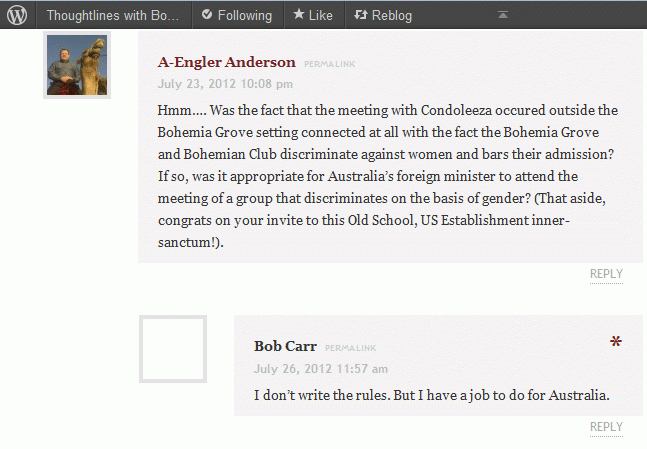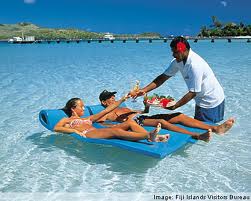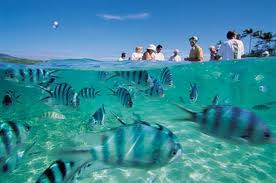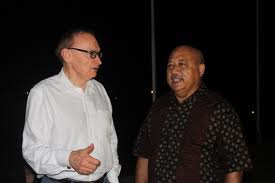By Patrick O’Connor
13 November 2012
Source: WSWS
The Australian Labor government is preparing to modify its flagship neo-colonial intervention in the South Pacific, the Regional Assistance Mission to Solomon Islands (RAMSI). Nearly 10 years after first dispatching hundreds of troops, federal police and government officials to take over the impoverished country’s state apparatus, Canberra is winding down RAMSI’s military component. The “transition” is aimed at ensuring the continued domination of Australian imperialism over political and economic life in the Solomon Islands.RAMSI involves personnel from different Pacific countries, but is controlled by Australia. There are currently fewer than 100 Australian soldiers on Solomon Islands, nearly 200 Australian Federal Police (AFP) and more than 100 civilian personnel, including officials working in key positions within the legal system, finance and treasury departments, and other parts of the public service. All have immunity from local laws.
The RAMSI operation commenced in July 2003, with the former Australian government of Prime Minister John Howard intervening in violation of international and Solomon Islands’ law. Cloaked in humanitarian claims about putting an end to civil conflict, the predatory operation was centrally aimed at bolstering Canberra’s hegemony in the South Pacific and shutting out rival powers from its “patch”, amid heightened geo-strategic rivalries across the region. The Australian government disarmed the Solomons’ police force and took control of its prison and judicial systems, central bank and finance department, and the public service.
Now, in the most significant recasting of the operation since its inception, RAMSI’s military component will be withdrawn in the second half of 2013. Also next year, RAMSI will no longer have its own “development” agenda. Instead, aid and other programs will be run bilaterally, via the Australian High Commission in Honiara. RAMSI’s policing component, the Participating Police Force, will continue operations at least until 2014, and likely for much longer than that.
The “transition” is being accompanied by rhetoric from the Solomon Islands government of Prime Minister Gordon Darcy Lilo about the need to prepare for the eventual withdrawal of the entire intervention force.
In reality, the Australian government has no perspective of ever leaving the Solomons. Foreign Minister Bob Carr visited RAMSI headquarters in August and declared: “Australia is going to be here to help Solomon Islands and its people for as long as they need our help ... We’re not going to withdraw. And RAMSI’s police function is going to continue for a long time after the military function is phased out.”
None of the underlying strategic issues that triggered Canberra’s decision to intervene in 2003 have been resolved. China enjoys closer diplomatic, economic and military ties with many South Pacific states than it did a decade ago. Moreover, the Obama administration’s “pivot” to the Asia-Pacific, involving an aggressive drive to contain Chinese influence, has placed further pressure on Canberra to fulfil the task assigned to it by Washington ever since the end of World War II—that of shutting out rival powers from the region.
The modifications to RAMSI are aimed at making the intervention force more cost efficient. For some time, RAMSI troops have comprised mostly reservists, and their Solomons’ deployments have functioned as expensive training exercises.
Patrick O'Connor - On RAMSI
" Cloaked in humanitarian claims about putting an end to civil conflict, the predatory operation was centrally aimed at bolstering Canberra’s hegemony in the South Pacific and shutting out rival powers from its “patch”, amid heightened geo-strategic rivalries across the region. "
Australian Defence Minister Stephen Smith, touring the Solomons in April, said the “orderly drawdown” of soldiers would leave “the very strong presence” of the AFP, which would “continue to be on the ground for any required response.” Smith added that the Labor government was looking to a new “defence cooperation program” in the Solomons, potentially involving regular Australian military visits or exercises.
Contingency plans are no doubt in place for a renewed military intervention in the event that Canberra regards its strategic position under threat.
It remains unclear how many, if any, of the Australian officials now implanted in different parts of the Solomons’ state apparatus will be withdrawn as part of the “transition”. So-called development assistance, which has included the lucrative salaries of AFP officers and RAMSI personnel—classified as Australian “aid”—will be removed from the intervention force’s brief. But RAMSI Special Coordinator Nicholas Coppel indicated this would allow for greater control from Canberra. “It’s been difficult to do very long term development assistance work when its horizon has been limited to a four-year budget cycle in Australia,” he stated. “Moving development assistance across to our normal AusAID bilateral program enables us to do much more long term planning for Solomon Islands.”
One of the aims of the RAMSI “transition” is to boost Australian corporate investment. Coppel told the Australia-Solomon Islands Business Forum in Brisbane last month that the changes marked “a clear signal that Solomon Islands is back in business” and demonstrated that the country’s economy would no longer be dominated by “an interventionist, post-conflict model of development assistance.”
Mining activity is being stepped up across the Solomons. A small Australian mining company, Allied Gold, now operates the Gold Ridge mine on Guadalcanal Island. Another Australian company, Axiom Mining, plans to soon begin work in Santa Isabel on one of the world’s largest nickel deposits, worth an estimated $60 billion. Mining companies from Britain, South Africa and Japan are exploring for gold, nickel, copper and other reserves, including on the seafloor. From the beginning, RAMSI was developed with an eye to ensuring that Australian transnational corporations received top priority in plundering Solomon Islands’ natural resources.
Club Em Designs















